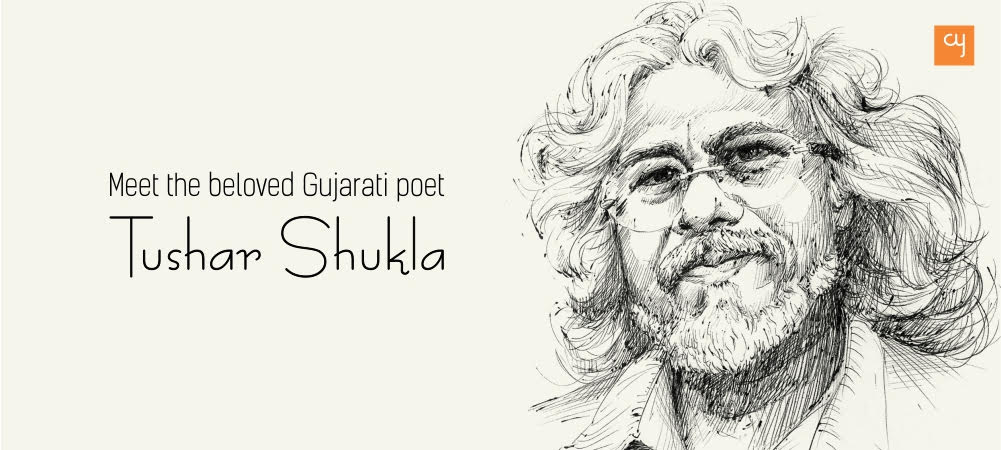The man behind much loved Gujarati songs like Puchhine thay nahi prem, Mann masti ane motor cycle, Bhaasha Mari Gujarati Chhe, O Rangrasiya and many more Shukla is gifted with the art of language.
આપણે એને સાચવી જાણીયે આપણને સાચવતી એ
ધૂળ નથી છે કુળ આપણું
ભાષા મારી ગુજરાતી છે
ભાષા મારી ગુજરાતી છે…
– Tushar Shukla
Celebrated as a poet, as a verbal proponent of the Gujarati language and as a former All India Radio anchor, who was the voice behind famous character Manjibhai, Tushar Shukla is also an author, lyricist, spoken word artist, playwright, actor, mentor to young talent at Gujarat University’s Department of Journalism and badass biker. Shukla is like a package that’s brimming over with life, enveloped by knowledge and yet, humble to the core. He is a rare culmination of youthful vivacity and saintly wisdom, a poet par excellence, whose fan following cuts across every demographic barrier. Meet the man whose words flow like pearls from his mouth.
When Performing is in the Blood
“My inclination towards creativity is an inherited gift,” said Tushar Shukla. His grandfather was an art teacher at a school in Palanpur. He used to paint backdrops for drama companies, accompanied by his son Durgesh. Durgesh gradually became fascinated by the performances and performers, and by the onstage vivacity and songs. In this era of the musical drama, Durgesh Shukla went on to carve out a niche for himself as a celebrated Gujarati playwright, author and poet. His commercial plays Roop Rang Rani, Pallavi Parni Gayi, Sundarvan and various Natishunya plays (plays with no female recitalists) were enacted across Mumbai.
People often remark on Tushar Shukla’s striking resemblance to his father. He says that he never inherited the skill of painting from his grandfather though. Instead, he picked up the gift of language. “My mother, who shifted from Karachi during the post-partition era, was a learned teacher by profession,” he said.“Both the bibliophiles (my father and mother) helped me to develop an unconditional love for books.”
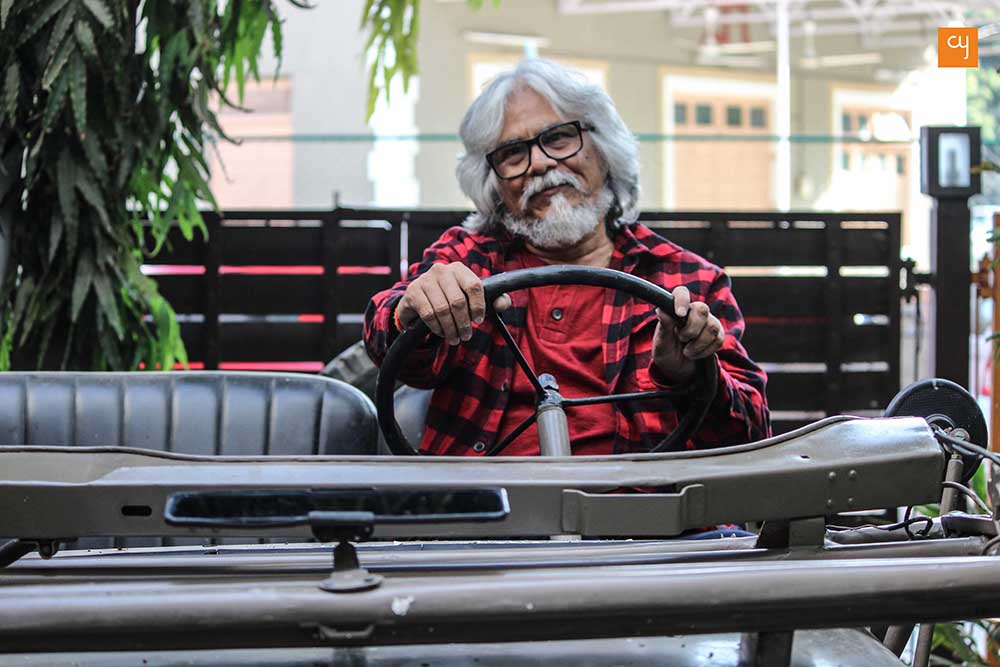
Being the School Orator
Shukla completed his schooling thoroughly in Gujarati medium, from Swastik Shishu Vihar School of Ahmedabad. It was during his favourite class – Literature – that he would polish his skill of expression. He would narrate stories for months at a stretch. “I created them impromptu,” he recalled. Spiderman, Superman, Thor and Batman were the characters in his story, drawn from his father’s nightly comic-book readings at home. Inventing his own stories in school taught him the skill of audience engagement. “As an avid reader, I was privileged to have an exhaustive word bank. Today, spoken-word has developed as my niche because I’ve always been a recipient of positive parenthood,” he mused.
Shukla’s family hailed from a humble financial background. He and his four siblings could visit the cinema only once a year and they couldn’t afford picnics. Shukla recalled,
“I understood the world around me largely through books. It was through words that I came to know about places. When I visited the Somnath temple after reading Munshiji’s Jai Somnath, it felt like déjà vu. Books helped me to enhance my imagination and expression. Even when I travelled with Morari Bapu to Nairobi in recent years, I was already well-read about the place. It made me feel so very familiar with an otherwise unknown terrain.”
Being On Air
After completing his schooling, young Tushar decided to walk in his father’s shoes and enrol in St Xavier’s College, Ahmedabad, to study Gujarati and English literature. This later led him to Gujarat University’ School of Languages for his Master’s degree. There is an unknown side to his career, as well – Shukla even completed his LLB, “just as a backup plan”. But he never practised it.
“I always wanted to become a language professor, but I was rejected in an interview because of my hands-on approach to teaching.” Shukla had very clear and strong views on the pedagogy which were disparate from the ‘follow text book only’ method. This was a fortunate accident, for him and the literature connoisseurs, as this led him to the doors of All India Radio. “This left me with no option but to join All India Radio (AIR) as an Announcer & Compère”, expressed Shukla.
AIR’s Akashvani Station was founded in Ahmedabad by Sardar Vallabhbhai Patel, in an era when Ahmedabad was called as ‘Manchester of the East’ because of its thriving textile industry. A major purpose behind forming this radio station was to entertain people, especially the labourers of the cotton mills. “In those days, ‘Shana Bhai’ and ‘Shakra Bhai’ were two characters on the programme. They were very famous among the daily wage earners of the textile mills,” reminisced Shukla, while dreamily reaching into the bygone days of his life. Shukla’s stint with AIR, somewhere in the latter part of 70’s started with anchoring of the popular ‘Shana Bhai and Shakra Bhai’ show. Gradually the show went off, and the opportunity came to Shukla to create a new character and breathe life in it. This saw the birth of ‘Manji Bhai’ – a character hugely popular among the AIR listeners.
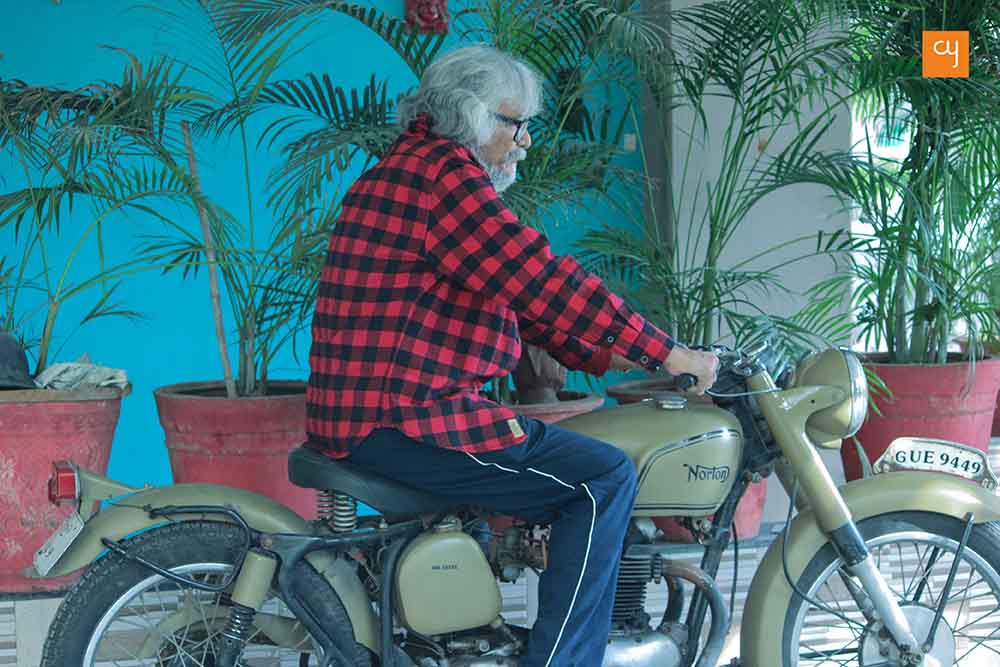
“I was a new joiner, a youngster fancily ornamented with bandana, denim and t-shirt,” Shukla chuckled. During theatre practice in his college days, he would enact characters using varied dialects of the Gujarati language. This helped him to pick up the character of Manji Bhai, who was a daily wage earner in textile mill, eventually becoming a household name in Ahmedabad. Manjibhai’s ability of overcoming hurdles of life as a layman and polite social observations and advices enveloped with soft humour connected every listener with his/her personal milieu. “I still remember that people wrote letters asking me to help them make their father quit smoking,” laughed Shukla, “They thought that I’m an elderly person who can give them the right guidance!” Such was the impact of a 25 year old Shukla’s enactment of Manjibhai.
Starting off in the junior-most position of Announcer Compere, Shukla went on to become India’s youngest Producer of programmes aimed at Children and Youth. Among is many popular shows, is ‘Kankuno Suraj’ a program dedicated to Gujarati Music, which was successfully presented by Shukla for a long period of 3 years. He eventually retired as the Station Director, one of the top administrative positions in Akashvani. His love for ‘interaction’ and ‘engagement’ is visible in the fact that in his entire career of 24 years, even with rising administrative responsibilities he never went away from the microphone.
Becoming Poet, Playwright, Screenwriter and Columnist
Tushar Shukla has an exhaustive repertoire of 30 published material under his name today. This includes five poetry anthologies, seven essay compilations, thirteen letter and diary formatted fiction books and five books on his thoughts. Each of these is a beacon for readers, guiding them on their interpersonal and intrapersonal relationships, and personal and social conflicts. But I was bewildered to know that the penman himself had never thought about having his material published. His poet friends Suresh Dalal and Kanti Madiya had once called him to Mumbai for a poetry recital.“As soon as the session was over, they asked me to leave my manuscript with them,” he recalled. “And that is how I was able to experience my words first time in a printed form. This is before the year 2000, when my first poetry compilation Tari Hatheli Ne was released.”
“Unlike my father, I have written only one play till now, Abhisarika, which was performed at NSD, Delhi, and only one film screenplay for Pardesh Ek Sapnu,” said Shukla. But his screenwriting skills have constantly been at work, ever since TV became a modern medium of entertainment, and Doordarshan was introduced. “It is my skill of fast writing that helped me to write Gujarati serials. Though the screenplays contain less literary value, as compared to my other writings, I learnt a lot from onscreen veterans like Vipul Vyas, Roopa Divetia and Chetan Raval.”
https://www.youtube.com/watch?v=iKxRRhx4-KE
Tushar Shukla is perhaps best known, however, as one of Gujarat’s most beloved poet. Starting from Tari Hatheli Ne, he continued his journey in songwriting and published one successful compilation after another – Maaro Varsad, Puchhine Thay Nahi Prem, Mann Masti ane Motor Cycle and Aashka, and many more. His chart-topping Gujarati songs and lyrics have been sung by singers like Shyamal Munshi, Aarti Munshi, Mitali Singh, Bhupindar Singh, Kavita Krishnamurthi, Aarti Munshi, Ashit Desai, Sadhna Sargam, Roopkumar Rathod, Aarti Munshi, and Saumil Munshi in Hastakshar Vol 4. Adding acting to his hats, he’s even appeared on the big screen for Gujarati films Bey Yaar playing a MF Hussain resembling artist, Vitamin She and Love ni Bhavai. However, this was more on request rather than a personal pursuit.
For eight years, Shukla contributed as a columnist for Gujarat Samachar (a popular Gujarati Daily), where he wrote his social observations. He has a very minute and at the same time simple comment on complex subjects; add to it his ‘music to the ears’ use of gujarati language, which endows a lot of popularity to his writings. More than an ‘elders advice’ his words come across as ‘voice from within’ – a feature that is characteristic to Shukla’s style and demeanour. He wrote in Gujarat Samachar under the section of Ek, Be Ne Sada Tran (One, Two and Three and a Half) and he continues his writing stint till date with Janma Bhoomi, a Mumbai-based weekly, under the column Black Coffee.
The Art of the Spoken Word
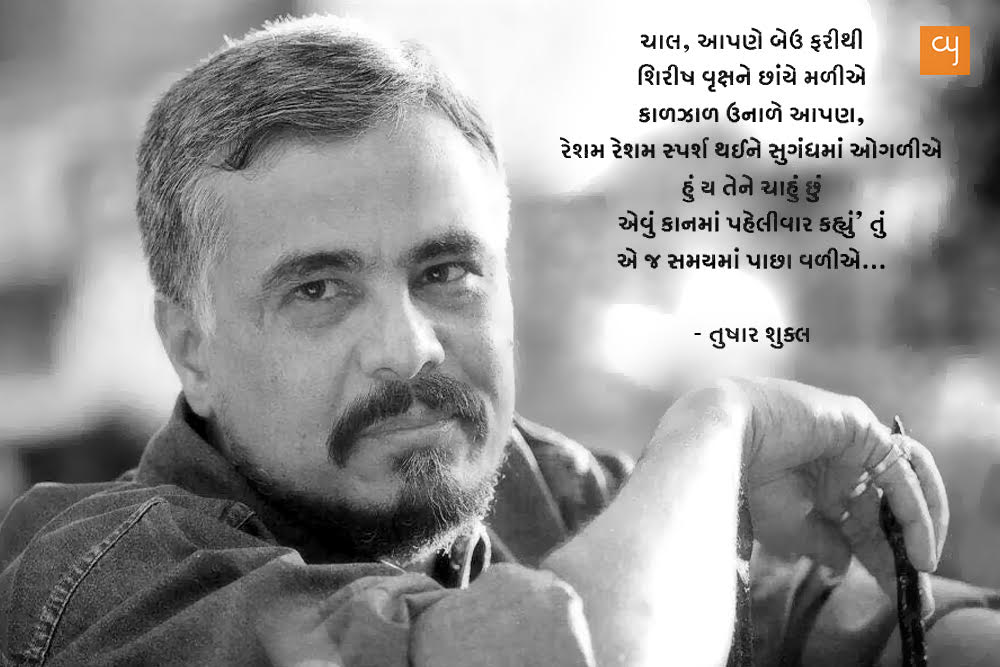
Shukla hosts numerous festivals and programmes across the globe today. But few know about the curious story that brought him into this line! “I believe that love has a lot of power. And it is my love for my wife that helped me to get my first opportunity in anchoring a concert,” recounted Shukla. Shukla’s wife is the cousin sister of the famous songster duo Shyamal–Saumil. To win her heart and to impress everyone in her family, he decided to anchor their first concert ‘MorPeenchh’ in 1980. This is how he first stepped into the spoken word realm. Shukla believes the spoken word has real power,
“Spoken word contains an extraordinary profoundness which the written word lacks, comparatively. One can differentiate Saurashtrian Gujarati from Surati Gujarati only by hearing, not through written words. Just like only through dialect can British English be differentiated from American English.”
To an entire audience, who may not be very well read, and yet into the consumption of literary offerings, Tushar Shukla’s is the voice that leads them through the doorway of Gujarati literature and tradition. Today he travels across the globe for Solo Talk Shows and as an anchor to Gujarati music heavy weights.
Tushar Shukla has been honoured with numerous accolades for his vast contributions towards literature. But he says, “The biggest award for me today is when the young generation adores my works and hums my songs. I am glad that I can sustain a rapport with them through my open-minded nature and literature.” An avid biker, Shukla’s motorcycle, which is actually seven decade old vintage classic, is a Norton custom made ratbike. As he puts it, biking is his third love, after family and writing!
Being an avid social media user, Shukla is fervently connected with his fans through his self-expressive posts and write-ups on Facebook. Since his commentaries are anecdotal, the audience loves to hear, share and believe his literary rich words. Shukla is a man brimming over with sparkling ideas and childlike curiosity. But what makes him special is his playful demeanor, eventually making his work much more approachable for English bred Gujarati generation. The only way I can think to conclude this piece is this verse from his extremely popular song.
દરિયા ના મોજા કઈ રેતી ને પૂછે
તને ભીજાવુ ગમશે કે કેમ,
એમ પુછી ને થાય નહિ પ્રેમ!
Illustration : Ketul Gamit
Yatra Archives

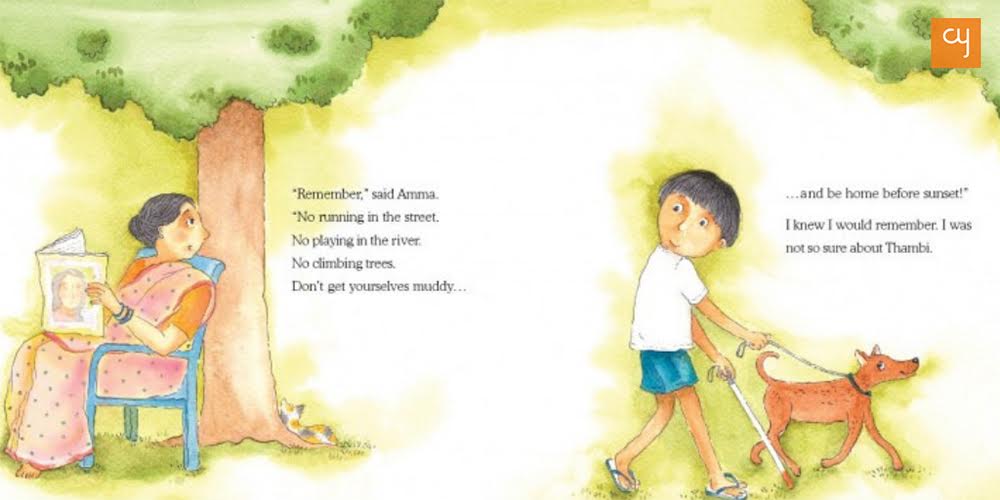 How Tulika Books is creating impact in children’s lives through picture books
Nandini Varma
How Tulika Books is creating impact in children’s lives through picture books
Nandini VarmaAug 21, 2019
A children’s book about a boy who feels like a girl. And about a child brought up by grandfathers. These are some of the stories published by Tulika Books, who have been making children’s picture books since 23 years. Little…
 Dalgona Coffee: A worldwide social media trend about home-made café experience
Harshil Shah
Dalgona Coffee: A worldwide social media trend about home-made café experience
Harshil ShahApr 2, 2020
While the lockdown has ignited various trends on social media, one that has received a major global following is #DalgonaCoffee. With thousands of posts on its name, here’s all you need to know about the Dalgona Coffee wave. I first…
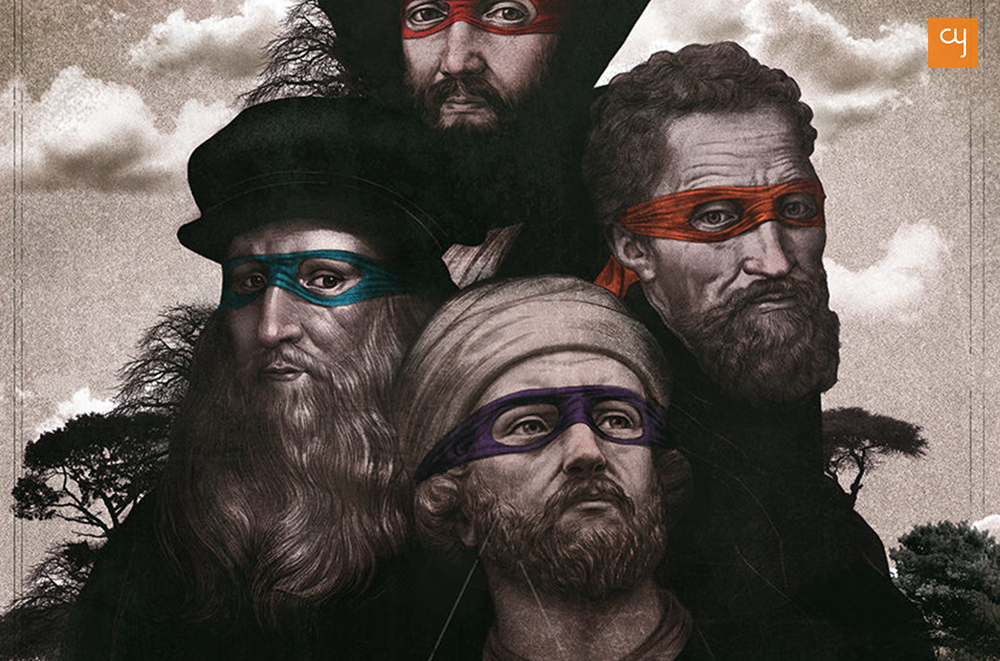 Leonardo, Michelangelo, Raphael and Donatello—Artists or Teenage Mutant Ninja Turtles characters?
Harshil Shah
Leonardo, Michelangelo, Raphael and Donatello—Artists or Teenage Mutant Ninja Turtles characters?
Harshil ShahNov 5, 2019
Did you ever wonder where the Teenage Mutant Ninja Turtles’ characters got their names from? Well, your search is complete. Here is a brief introduction of the artists from whom the creators of TMNT took inspiration. Teenage mutant ninja turtles,…
 The call of the mountains: orthopaedic Dr Yatin Desai’s advice on trekking
Himanshu Nainani
The call of the mountains: orthopaedic Dr Yatin Desai’s advice on trekking
Himanshu NainaniMay 24, 2019
In this piece 64 year old Dr Yatin Desai, shares with CY his inspiring story of how to scale towering mountains with utmost ease and how this life adventure activity can shape human character and health. Chances are high that…


